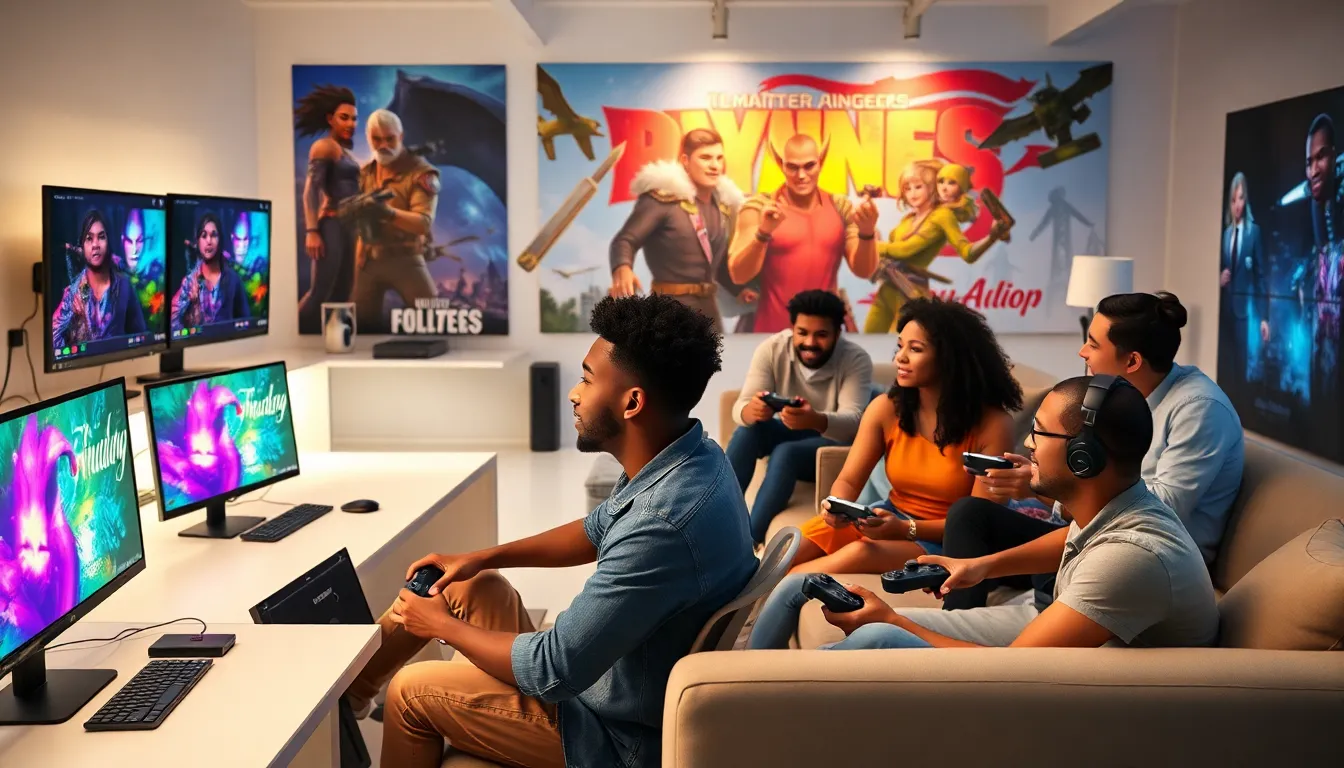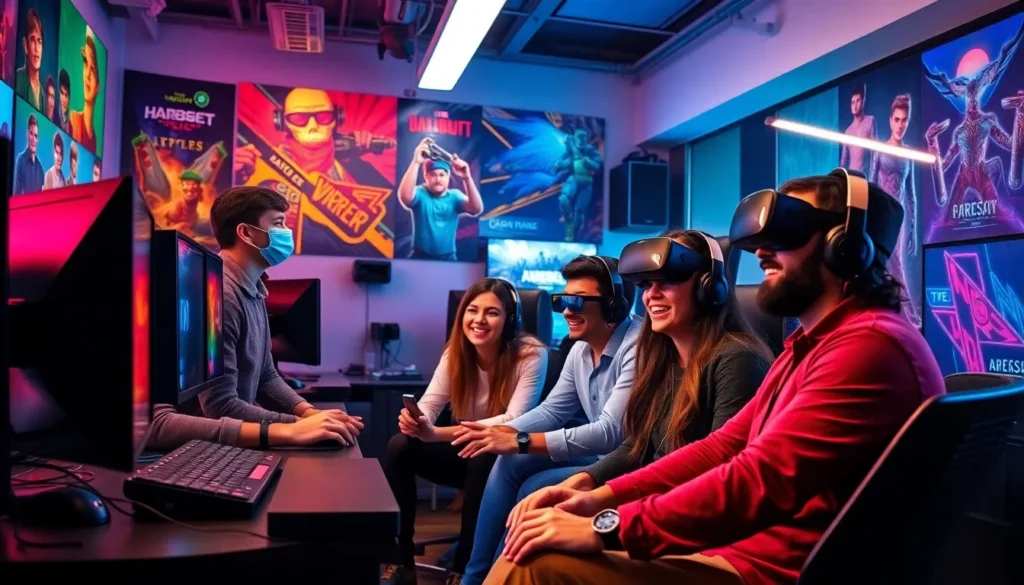Table of Contents
ToggleWelcome to the thrilling universe of gaming, where controllers serve as gateways to infinite worlds and pixels pack an emotional punch. If you’ve ever spent hours glued to your screen, devoid of food, water, or sleep, you know there’s something inherently magical about being a gamer. Gaming isn’t just a hobby: it’s an odyssey. Join us as we embark on this journey through the evolution of gaming culture, the explosive rise of esports, and even a peek into the future of gaming technology. Grab your favorite snack and settle in: this isn’t just any gaming article, it’s your ticket to the heart of what makes this culture so irresistible.
The Evolution Of Gaming Culture

A Brief History Of Video Games
From pixelated blocks to hyper-realistic graphics, the history of video games is as colorful as a candy shop. It all began in the late 1950s with rudimentary experiments on computers, leading to the game that started it all: “Tennis for Two” in 1958. Fast forward to the 1970s, and the arcade revolution hit with games like “Pong” capturing hearts and quarters alike. By the 1980s, home consoles became the norm, making gaming accessible to the masses. Who could forget those unforgettable days when the Super Mario Bros. theme song echoed through living rooms?
Now, as we pivot to today’s gaming culture, we see communities exploding online. Social media platforms have allowed gamers to connect with others worldwide. They share strategies, create fan art, and stream their gameplay. Gamers aren’t just solitary figures anymore: they’re part of a vibrant global tapestry.
Impact Of Online Gaming Communities
Online gaming communities have transformed how players interact, learn, and challenge themselves. Platforms like Discord and Twitch have created spaces where gamers can collaborate and share their passions. These communities offer a haven for fans to celebrate everything from indie games to blockbuster titles, fostering a sense of belonging. Whether it’s cheering on a teammate during a thrilling match or discussing plot twists in a fantasy epic, the bonds formed in these communities are as compelling as the games they love.
The Rise Of Esports
Esports has exploded onto the scene in recent years, transforming casual gaming into a spectator sport. Once viewed as a niche hobby, competitive gaming now fills stadiums worldwide. Millions of fans tune in to watch players battle it out in titles like “League of Legends” and “Dota 2,” where teamwork and strategy combine into electrifying showdowns.
Professional gamers often train for hours every day, akin to Olympians preparing for their events. Huge prize pools entice talent, while sponsorships elevate esports onto global stages. It’s not just gaming: it’s the birth of a new form of entertainment, complete with commentary and fanfare. This evolution underscores the undeniable momentum that esports carries forward into the future.
Understanding Different Gaming Genres
Role-Playing Games: Immersive Worlds
Role-playing games (RPGs) invite players into immersive worlds where they can become heroes, villains, or something in between. Titles like “Final Fantasy” and “The Witcher” allow players to shape their destinies, making choices that impact narrative outcomes. With rich storytelling and character development, RPGs often transport players into landscapes that linger in their minds long after they’ve logged off.
First-Person Shooters: Fast-Paced Action
First-person shooters (FPS) have carved their niche by offering pure adrenaline and fast-paced gameplay. Games like “Call of Duty” and “Overwatch” require quick reflexes, strategic thinking, and teamwork as players navigate harrowing battlefields. The thrill of scoring a headshot or successfully executing a team strategy provides an exhilarating experience unlike any other.
Puzzle Games: Brain Teasers For Everyone
Who said gaming can’t be good for the brain? Puzzle games like “Tetris” and “Portal” challenge players to think critically, showcasing not just entertainment but cognitive development as well. They’re perfect for a quick gaming session during a coffee break or for winding down after a long day. Every solved puzzle feels like a triumph, rewarding players with satisfaction and a boost of confidence.
Navigating The Gaming Landscape Today
The Influence Of Streaming Platforms
In today’s digital age, platforms like Twitch and YouTube Gaming have changed the rules of engagement. Players aren’t just consumers: they’re also entertainers. Top streamers attract hundreds of thousands of viewers, hosting live gameplay sessions that feel more like engaging TV shows than mere gameplay. This wave of interaction allows viewers to influence the gaming experience in real-time. What once was an isolated experience is now shared, interactive, and spectacular.
Mobile Gaming: Gaming On The Go
Mobile gaming has made its mark, allowing players to jump into their favorite experiences anywhere they go. From hardcore titles like “Genshin Impact” to casual classics such as “Candy Crush,” mobile games cater to diverse preferences. Coupled with powerful devices, mobile gaming delivers stunning graphics and expansive worlds right in your pocket. Today, everyone can be a gamer, whether standing in line at the grocery store or commuting to work.
The Future Of Gaming Technology
Virtual Reality: A New Frontier
Virtual reality (VR) is reshaping the gaming landscape by immersing players in entirely new worlds. With headsets like the Oculus Rift and the PlayStation VR, players can become part of their games. Imagine wielding a sword in a fantastical battle or solving mysteries as if they were standing there. As technology advances, we’ll likely see VR rose beyond gaming into arenas like education and training, creating endless possibilities.
Artificial Intelligence In Gaming
Artificial intelligence (AI) is revolutionizing how games are designed and played. By creating smarter, more adaptive NPCs and enhancing user experiences, AI improves immersion and engagement. Game developers are harnessing AI to analyze player behavior and tailor experiences, eventually creating dynamic worlds that respond to individual playstyles. The future is bright as AI continues to evolve, shaping how games are developed and enjoyed.




